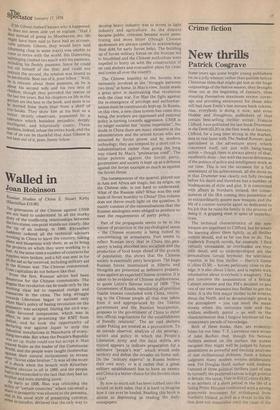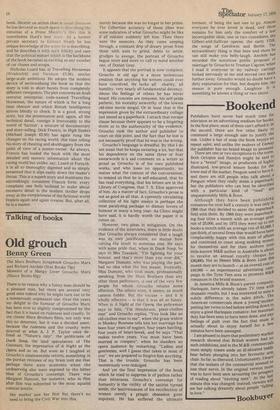Crime fiction
New thrills
Patrick Cosgrave
Some years ago some bright young publishers hit on a jolly wheeze: rather than publish before Christmas titles that might get lost in the huge outpourings of the festive season, they brought these out at the beginning of January, thus ensuring themselves maximum review coverage and providing enticement for those who still had Aunt Emily's last minute book tokens. Alas, everybody is doing it now, and even Hodder and Stoughton, publishers of that certain best-selling thriller writer, Francis Clifford, have published his last book Drummer in the Dark (0.25) in the first week of January. Clifford, for a long time strong in the market, shot to real fame writh The Naked Runner, and specialised in the adventure story which concerned itself, not just with bang-bang action — though there is always plenty of that, excellently done — but with the moral dilemmas of the politics of police and intelligence work in our time. This is not the occasion for a full assessment of his achievement, all the more so in that Drummer was clearly not fully revised before his death and therefore has a number of inadequacies of style and plot. It is concerned with affairs in Northern Ireland, the consequences of the IRA coming into possession of an extraordinarily potent new weapon, and the life of a counter-terrorist agent so dedicated to his job that he ruins his family in the process of doing it. A gripping read, in spite of imperfections.
The technical characteristics of the new weapon are important to Clifford, but he wears his learning about them lightly, as all thriller writers should, and as far too few so do. The Frederick Forsyth novels, for example, I find virtually unreadable, so overloaded are they with detail, and so underdeveloped are the personalities. Gerald Seymour, the television reporter, in his first thriller — Harry's Game (Collins £3.50) — hovers perilously close to the edge. It is also about Ulster, and is replete with information about everybody's weaponry. The plot concerns the assassination of a British Cabinet minister and the PM's decision to put one of our own assassins into Belfast to get the killer. It is the first major thriller to, be written about the North, and so devastatingly good is the atmosphere — you can smell the mean streets where the terrorists hide and the soldiers endlessly patrol — as well as the characterisation that I forgive Seymour all the unnecessary parade of knowledge.
Both of these books, then, are evidently fables for our time. T. E. Lawrence once wrote of John Buchan that, though his famous thrillers seemed on the surface the purest escapism they might well be judged by future generations as powerful and exciting analyses of real civilisational sickness. Such a future judgment many modern writers deliberately seek. For Douglas Hurd, author with Andrew Osmond of three political thrillers (and of one by himself), the preferred canvas is high politics in Britain. His latest, Vote to Kill (Collins £3.50), is an account of a short period in the life of a fading Prime Minister confronted with a strong grass-roots movement for withdrawal from Northern Ireland, as well as a threat to his life that does not materialise until the close of the
book. Shorter on action than is usual (because he has devoted so much space to describing the minutiae of a Prime Minister's life) this is nonetheless Hurd's best book. As a former private secretary to Edward Heath he has unique knowledge of the scene he is describing; and he describes it with such felicity and care that the political minuet which is the backbone of the book becomes as exciting as any number of car chases and scraps.
Nicholas Luard has, in Travelling Horseman (Weidenfeld and Nicolson £3.50), similar large-scale ambitions. He adopts the modern device of sectionalising the book so that the story is told in short bursts from completely different viewpoints. The plot concerns an Arab terrorist enterprise, code-named Travelling Horseman, the nature of which is for a long time obscure and which British Intelligence strives blindly to check. It is a good, strong story, but the presentation and, again, all the technical detail, consign it irrevocably to the world of `faction', a mixture of documentary and story-telling. Dick-Francis, in High Stakes (Michael Joseph £2.95) has again rung the changes on the racing world, this time telling his story of cheating and skulduggery from the point of view of a punter-owner. As always, Francis has loaded the book with the most detailed and esoteric information about the racing world but unlike, say, Luard or Forsyth, • it is all so thoroughly digested and so simply presented that it slips easily down the reader's throat. This is a superb story and maintains the astonishingly consistent Francis form: every complaint one feels inclined to make about excessive detail in the modern thriller drops away at the completeness of the fictional world Francis again and again creates. But, after all, he is a master.



























 Previous page
Previous page